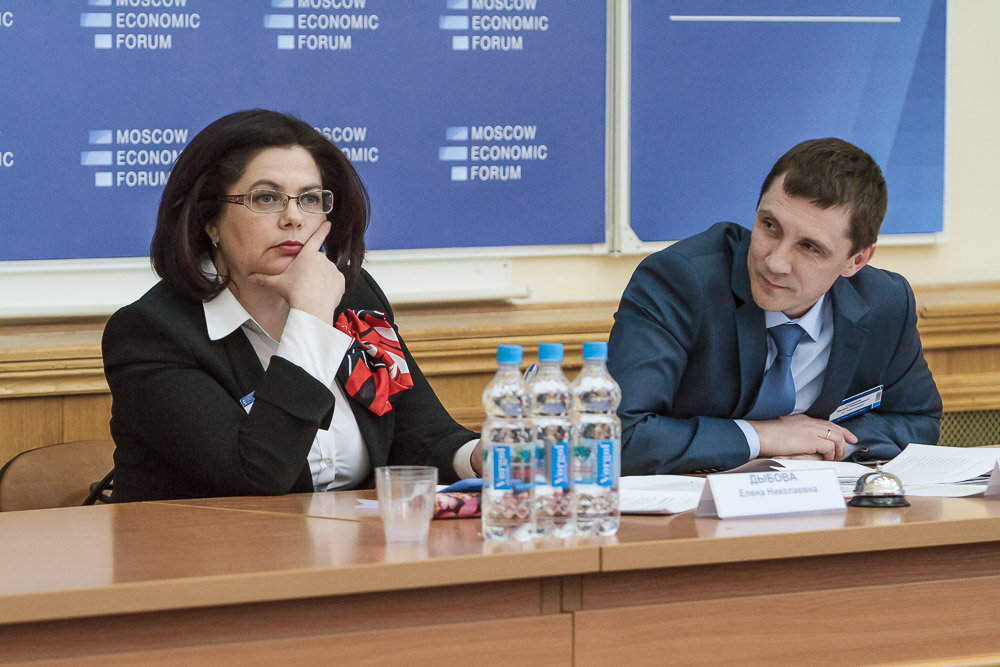
Published: March 30th, 2017
On March 30, within the framework of the Moscow Economic Forum, a round table under the title "Weak ruble and its impact on the economy and society. Short, medium and long-term forecast” was held, during which participants discussed how the value of the Russian currency correlates with the level of inflation and oil prices, does the ruble have the potential to strengthen beyond the peg to oil, and how the geopolitical situation affects the course's change.
The moderator of the discussion was Elena Dybova, vice-president of the Chamber of Commerce and Industry, and Vadim Smirnov, general director of Eurotechnika.
The representative of the production enterprise, Vladimir Nikolayevich Boglaev explained why the Russian producer benefits from a weak rate based on China's economic experience.
"A certain strengthening of the ruble in the near future will continue, because oil will intensify. This will lead to further stagnation and oppression of production, benefit in production in industry, "- concluded the expert.
Katasonov Sergey Mikhailovich, First Deputy Chairman of the State Duma Committee on Budget and Taxes, spoke about the pros and cons of the fall of the ruble, cited arguments, referring to his own experience. The expert also noticed that 21 million Russians live below the poverty line. In the impoverishment of the population, the deputy sees the main problem of the fall of the ruble.
"In my understanding, the course should be predictable. In my opinion, the attempt to go on a floating course was a mistake, "Katasonov shared his opinion. To do this, it is necessary to avoid the floating rate, legislatively amend the law on the central bank, the government should be responsible for real economic changes in the country, the expert believes.
Igor Nikolayev, Director of the Institute for Strategic Analysis, Financial and Accounting Consultants, Doctor of Economics, Professor of the Higher School of Economics, spoke about the tools that help inflate the course. The professor singles out two mechanisms: the curry-trade investment technologies used by speculators, and the policy of devaluation of bank assets.
"Our ruble remains potentially weak, but with an overvalued rate, and the economy is weak. A strong economy is a strong currency; a weak economy is a weak currency. But when you are artificially overvaluing this weak currency, you create such a skew, which is fraught with a very painful resolution," concluded Nykolaiv.
Razbrodin Andrei Valentinovich, president of the Russian Union of Textile and Light Industry Entrepreneurs, agrees with this thesis. According to him, speaking about the impact of the national currency, it is necessary to consider the situation in the country and all other factors. From the position of a representative of light industry, the expert explained that a change in the exchange rate triggered a logistical collapse, and then a situation arose for import substitution and growth. There was a huge number of emergencies, small enterprises, and new enterprises.
Maxim Kalashnikov, writer and futurist, sees the prospect of economic growth in the complex impact of credit and financial policy, protectionism and active industrial policy. The speaker also stressed that the ruling class is trying to replace cheap imported goods with domestic ones, because if there are strong domestic producers, they will demand political power.
"If we continue to exist within the open wide economy, forgive me, we will march from devaluation to devaluation. And each time such devaluation will cost more and more ", - the expert summed up.
During the discussion, participants noted that the Russian ruble was in the grip of economic policy. On the one hand, a weak currency opens up opportunities for exports, which should contribute to the growth of national production. On the other hand, the devaluation of the national currency hits the pockets of ordinary Russians and, one way or another, immediately inflates prices in stores.
Latest news
07.05.2018 MEF-2018: debate "Cultural policy: between individual freedom and the interests of society?"
07.05.2018 MEF-2018: Conference No. 8
07.05.2018 MEF-2018: Conference No. 4
07.05.2018 MEF-2018: Conference No.3
07.05.2018 MEF-2018: Conference No. 2
07.05.2018 MEF-2018: Conference No.1
26.04.2018 McConnell Discusses Information Warfare
20.04.2018 MEF-2018: closing plenary session
17.04.2018 Mr. Freysinger: «Skripal’s case» for relationship between Russia und European Union?
